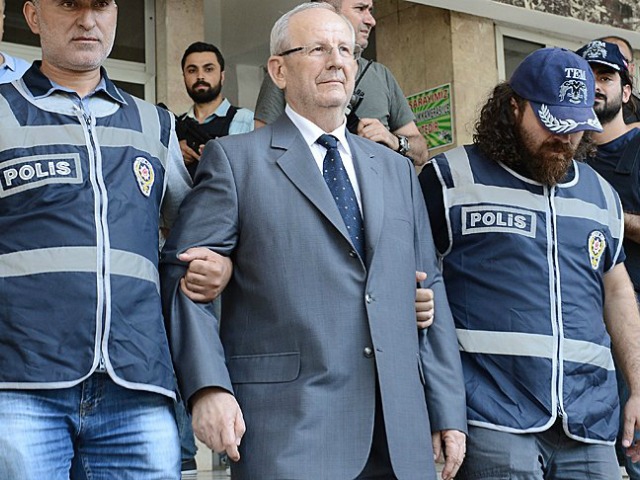Turkish general born in Serbia
arrested after coup attempt
arrested after coup attempt
The most senior Turkish army officer to be arrested so far after last week's failed coup is General Adem Huduti, Turkish media have reported. The General was arrested on Saturday, and on Monday a Turkish court ordered him to be placed in detention.
Huduti, who was commander of Turkey's Second Army at the time of his arrest, was born in Serbian Autonomous Province of Kosovo and Metochia. General Huduti was stationed in Malatya, Anatolia, with the responsibility to protect Anatolia, and protects Turkey's borders with Syria, Iraq and Iran.
He was born in 1952., in the village of Recane (in Srbian: Речане, pron.: Rechane), near the town of Prizren, in Metohija.
Though Shqiptar media in Serbian Occupied Territories of Kosovo and Metochia (SOTKM) said that Huduti belonged to the "Bosniak minority in Kosovo" (they are well known and foreign supported falsifiers of history), Huduti belonged to the Turkish ethnic minority in Metohija. These Turks remained in Serbia in the South Metohija after the First Balkan War in 1912. However, "Bosniak" has been modern post-Tito's era "invention", since 90's. "Bosniak" had been popular name in past times for Muslims from Bosnia, as geographical determinant. During 90's when Muslims in Bosnia wanted o define themselves as the nation, they could not use their religious name, but reused "geographical" name - Bosniaks. Generally, "Bosniaks" are converted Ortodox or Bogomil Serbs or Catholic Croats in lesser extent and in Western Bosnia, mostly.
In Socialistic Autonomous Province of Kosovo and Metohija of Socialistic Republic of Serbia (official name, in full), Turkish national minority had been the subject of Shqiptar's oppression, for decades, the same way as Serbs and everybody that was not of Shqiptar ethnic minority in Serbia's Autonomous Province of Kosovo and Metohija. The main pressure on Turks had been to start declaring themselves as Shqiptars or to be gone. Obviously, general Huduty's parents made the second choice. This ethnic cleansing of Kosovo and Metohija was covered in full by Tito's regime. Every Serb individual and/or the institution that objected to this policy were labeled as "Serbian nationalists and chauvinists" and were prosecuted. The same stayed today's, 25 years after communists. "Somebody else" makes sure that communist's legacy live. The same "Somebody else" who sent Lenin from Switzerland via. Germany and Finland to St. Petersburg to start communist revolution in Russian Empire.
In the past he commanded units on Turkey's border with Russia and Greece, and also in Afghanistan, Serbian state broadcaster RTS said.
Huduti's family moved to Turkey when he was five years old.
He graduated from the Military Academy in 1973. Huduti served in the 3rd Mechanized Infantry Division of the 7th Mechanized Infantry Brigade on the Turkey-Greece border, as well as in Erzurum 9th Army Corpson on the border with Russia. For many years, Huduti had worked at the NATO's Allied Land Forces Southern Europe Headquarters in Italy that intertwined in global and regional crises.
He graduated from the Military Academy in 1973. Huduti served in the 3rd Mechanized Infantry Division of the 7th Mechanized Infantry Brigade on the Turkey-Greece border, as well as in Erzurum 9th Army Corpson on the border with Russia. For many years, Huduti had worked at the NATO's Allied Land Forces Southern Europe Headquarters in Italy that intertwined in global and regional crises.
 |
| Turkish Army general ranks |
 |
| General Adem Huduti. Photo: Anadolu Agency. |
Sources: B92, CNN Turk, Haberler, itv News, BalkanInsight, Wikipedia
Bosnia's Muslims Keep
Worried Eye on Turkey
Worried Eye on Turkey
Bosnian Muslims - or as they call themselves "Bosniaks" - many of them admirers of President Erdogan, are keenly following latest developments in Turkey, where a military coup was quashed at the weekend.
 |
| A group of Bosnian residents protesting in support of Erdogan on Saturday in the capital, Sarajevo. Photo: Anadolu. |
“Turkey is really important for Bosnia, so what happens in Ankara or Istanbul has a big impact on our country," Sead Murtic, a 59-year-old resident from Sarajevo, told BIRN.
“The Turkish government and citizens have helped our country a lot in the past … of course, we were deeply concerned after we found out what was happening on Friday," Samir Zubovic, a 20-year-old student from Sarajevo, added.
 |
| Erdogan in Sarajevo |
In divided Bosnia, this warm attitude is not spread all over the country, however, and is largely restricted to Bosniaks [Bosnian Muslims].
Newspapers and media targeting Bosnian Croats, like the Mostar-based Dnevni List, or the Bosnian Serbs, like the Banja Luka-based paper Nezavisne Novine, show far less interest in the topic, Kontic noted.
“The Party of Democratic Action, [the SDA - the biggest Bosniak party] based part of its election campaign in 2014 by reaffirming a kind of connection with Turkey and with President Erdogan,” Kontic recalled.
In recent years, Turkish influence in Bosnia has grown. Commercial exchanges between the two countries and investments from Turkey in Bosnia have all increased.
Ankara has also cemented cultural ties with Muslim Bosnia, partly by funding the restoration of the country's old Ottoman-era heritage, as BIRN reported.
Bosnia formed part of the Ottoman Empire for centuries until Austria-Hungary occupied it in 1878 and annexed in 1908.
After news of the failed coup broke, Bosniak politicians rushed to express solidarity with Erdogan.
The Bosniak member of the Bosnian Presidency, SDA leader Bakir Izetbegovic, called the attempted coup "a menace" which might interrupt "the development of democracy in Turkey.
“Erdogan ... has strong support here, amongst us in Bosnia," Izetbegovic told Turkish Anadolu news agency.
A small rally in support of President Erdogan was organised in the Bosnian capital, Sarajevo, on Saturday.
Source: BalkanInsight



No comments:
Post a Comment